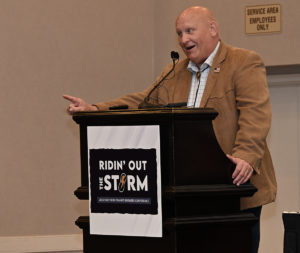ZimmCast 749 – Tech Hub LIVE 2025
 In five short years, Tech Hub LIVE has already become the go-to meeting of the year for agricultural retailers and ag tech companies.
In five short years, Tech Hub LIVE has already become the go-to meeting of the year for agricultural retailers and ag tech companies.
In this edition of the ZimmCast, we hear from a couple of the CropLife Ag Tech Awards of Excellence winners this year – Aman Anand with Nutrien Ag Solutions and Iowa farmer April Hemmes, and we learn more about two of the show’s major sponsors from Scott Cogdill with Agworld, and Kelly Miller of AgriAccess.
Listen to the episode here:
ZimmCast 749 - Tech Hub LIVE 2025 (29:11)
That’s the ZimmCast for now. Please let us know if you have ideas for a future podcast. Just email Chuck at chuck@zimmcomm.biz.
We hope you enjoyed it and thank you for listening.
Subscribe to the ZimmCast in:
DWFI Podcast 44 – The Vadose Zone
 The vadose zone is the area between crop roots and the water table, and is a critically important region for storage, transport and transformation of chemicals that can impact groundwater quality. In this episode of the Water for Food Podcast, host Frances Hayes talks with Arindam Malakar, a researcher with the Nebraska Water Center (NWC, a part of DWFI) who studies Nebraska’s vadose zone and monitors the impacts of irrigation and fertilizer on groundwater.
The vadose zone is the area between crop roots and the water table, and is a critically important region for storage, transport and transformation of chemicals that can impact groundwater quality. In this episode of the Water for Food Podcast, host Frances Hayes talks with Arindam Malakar, a researcher with the Nebraska Water Center (NWC, a part of DWFI) who studies Nebraska’s vadose zone and monitors the impacts of irrigation and fertilizer on groundwater.
Hayes is also joined by Marie Krausnick, assistant general manager for Nebraska’s Upper Big Blue Natural Resources District (NRD). The Upper Big Blue NRD and other NRDs across the state have partnered with the University of Nebraska-Lincoln and the Nebraska Water Center in researching nitrate concentration in their districts. While nitrate levels in some areas have decreased in the Upper Big Blue NRD, there has been an overall increase of 54% in the district.
In Nebraska, as in many parts of the world, one of the key chemicals monitored in the vadose zone is nitrate. Nitrogen is a critical plant nutrient, but once it sinks below the roots and enters the vadose zone, it becomes a liability: both an economic loss for the farmer and a potential public health risk for some rural communities where wells have not been recently tested. Excess nitrate in drinking water can cause adverse health effects, particularly in infants and vulnerable populations, as too much nitrate in the body makes it harder for red blood cells to carry oxygen. Contaminants, like nitrates, present in the vadose zone can eventually appear in the underlying aquifers. NWC takes soil cores all the way down to the groundwater table, sometimes over 100 feet, and tests them for nitrate and other contaminants. These cores are crucial for understanding how water and chemicals move through the soil and potentially reach groundwater. They can also be useful in predicting water quality issues. The Nebraska Water Center Water Sciences Lab has collected vadose cores for decades. To increase the usability of all this data, they launched the Nebraska Vadose Zone Program online portal in 2015 with funding from the Nebraska Environmental Trust, Nebraska Department of Environment and Energy (now the Nebraska Department of Water, Energy, and Environment), and several Natural Resources Districts (NRDs).
Listen here or subscribe on your favorite podcast platform:
DWFI podcast episode 44 50:41
The Robert B. Daugherty Water for Food Global Institute (DWFI) at the University of Nebraska was founded with the mission to have a lasting and significant impact on achieving more food security with less pressure on scarce water resources by conducting scientific and policy research, using the research results to inform policy makers, and sharing knowledge through education and communication.
How to subscribe:
Animal Ag News 7/29
Ag Retailers Face Challenges on Federal Level
Coppock says one of the bigger issues is the impact the Make America Healthy Again (MAHA) report released in May could have on the agricultural industry as a whole. “We’re all watching and trying to to contain that as best we can so that it doesn’t become something where it impedes our ability to produce food. That’s a fundamental economic benefit in our country that we take for granted, and if we do something to upset that cart, people are going to be hungry and it’ll be too late,” he said.
ARA said when the report was issued that the conclusions in it regarding pesticides contradict longstanding scientific research and fail to acknowledge the critical role pesticides play in ensuring food security and public health.
Coppock also noted that the Trump Administration approach to trade agreements over the past few months has created a lot of uncertainty within the ag retailer business. “We operate in a very global supply chain business. And so we’ve been over to the White House to visit with people and say, look, you can’t operate a business like this in a global supply chain when you don’t know from one day to the next what tariff rates going to be on a particular product,” said Coppock.
The One Big Beautiful Bill did contain some beneficial provisions for agriculture and gave some certainty for some farm bill provisions. “There were there were a number of tax provisions in that bill that we supported. We are also we’re very interested in the extension of the farm bill policies that they moved. I wish it could have been done in a farm bill. I think Chairman Thompson wishes the same thing. But the fact that the farmers have some some stability now to plan their operations, their bankers have some stability to be able to finance those operations. That’s a huge deal to get done in that in that bill.”
Learn more in this interview:
Daren Coppock, ARA (5:52)
Tech Hub LIVE Farmer Panel Hits Home Run
Moderated by Farm4Profit Podcast co-host Tanner Winterhof, the panel included three innovative Iowa farmers: April Hemmes, Hemmes Farms in Hampton, Iowa; Tanner Knupp, Knupp Farms in Southeast Iowa; and Jeremy Muff, C & JM Farms, western Iowa. Winterhof grew up on a family farm in northwest Iowa. “But ultimately I don’t make any or very many of the decisions. So I’m excited to talk to these real farmers today, not ones that just play farmers on a podcast like myself,” he said.
April Hemmes, who received this year’s Ag Tech Visionary Farmer of the Year Award, is the full-time farmer on her 1,000 acre operation while her husband works off the farm. “So I got what I call a farming husband – my fertilizer and chemical guy. I went that way purely because of the service I got,” April said when she was asked about how she makes her input buying decisions. “It is a relationship business.”
Service was a common theme echoed by the farmers when it came to who got their business. Muff, who shocked the audience with his introduction when he said he just traded in all of his Case equipment for John Deere, said it came down to service. “I don’t know if we got tractors that were built in COVID or what, but we just seem to have a ton of breakdowns and we just weren’t getting the best service for repairs and finally, just made the switch,” said Muff. “We knew the technology was probably ahead of Case, it was the price that was holding us back. But after a while, you know, breakdowns cost money too, even if it’s warrantied, it’s still your downtime. So that was that was the main reason.”
Knupp said trust is most important for him. “Work with people that you trust. Number one is profit,” he said. “And at the end of the day, every farm is going to be different. So, working with your farm, your fields, your tile guys, your chemical guys, your seed guys work, work within yourself. Quit worrying about what the neighbors doing.”
Listen to their candid conversation here:
THL Farmer Panel (37:20)
House Ag Chair Addresses Peanut Growers
 During the Southern Peanut Growers Conference, Congressman G.T. Thompson, House Ag Chair, participated in today’s general session. He talked about the farm bill which he described as provision in the One Big Beautiful Bill as version 1.0. He talks about the process and what these provisions mean to farmers and particularly peanut growers. He also met with several ag media who asks questions.
During the Southern Peanut Growers Conference, Congressman G.T. Thompson, House Ag Chair, participated in today’s general session. He talked about the farm bill which he described as provision in the One Big Beautiful Bill as version 1.0. He talks about the process and what these provisions mean to farmers and particularly peanut growers. He also met with several ag media who asks questions.
Congressman G.T. Thompson Remarks
Remarks from G.T. Thompson (29:57)
Congressman G.T. Thompson Press Conference with media
Remarks from G.T. Thompson (12:00)
Successful Tech Hub LIVE 2025 Concludes
 The fifth annual Tech Hub LIVE Conference and Expo wrapped up another hugely successful event this week, ensuring they will be back again next year in Des Moines.
The fifth annual Tech Hub LIVE Conference and Expo wrapped up another hugely successful event this week, ensuring they will be back again next year in Des Moines.
The exhibit hall was packed this year with the latest and greatest in ag technology, including an impressive group of companies who were honored for being there all five years: AgVend, DTN, EarthDaily, Ever.Ag Agribusiness, Growers Edge, AgWorks/FieldReveal by McGregor Technologies, Midwest Laboraties, Praxidyn, Ranch Systems, Inc., Razor Tracking, SoilView, LLC, Software Solutions Integrated, Taranis, Inc., TELUS, and Waypoint Analytical.
 One of the newer exhibitors this year, and the biggest on the floor, was Emergent Connext, creating wireless solutions for the ag industry. “If your entire farm isn’t covered, then your technology doesn’t work,” said CEO Mike Roudi. “We make the internet access that tech solutions require to be effective.”
One of the newer exhibitors this year, and the biggest on the floor, was Emergent Connext, creating wireless solutions for the ag industry. “If your entire farm isn’t covered, then your technology doesn’t work,” said CEO Mike Roudi. “We make the internet access that tech solutions require to be effective.”
Roudi says they had a very small presence last year at THL but went really big this year to highlight some of their partners at the show and tell their story and they had a very good response.
Mike Roudi, CEO, Emergent Connex (4:09)
AI was a topic that came up in nearly every session and breakout at the conference. The final general session on Tuesday, retailers weighed in on what’s working, what’s missing, and what still needs to be built when it comes to AI for agriculture. Aman Anand with Nutrien Ag Solutions is very optimistic about the three A approach that AI brings to farming. “Acquisition of data, analysis of that data, and finally creating actionable insights,” said Anand, who received the new Emerging Leader Ag Tech Excellence Award this year. “It will change farmers’ lives.”
Anand serves on the advisory board for Tech Hub LIVE and says the conference is needed for all aspects of the agtech industry. “It should be applicable to everyone,” he said. “Our goal is that everyone in the ag value chain will get benefit from it.”
2025 Ag Tech Award winner Aman Anand (6:16)
 Tech Hub LIVE was pleased to have the generous sponsorship of a variety of industry partners, many of whom have provided support for many years. Scott Cogdill is currently Director of Business Development for Agworld, which was registration sponsor this year, but Scott has been supporting Tech Hub LIVE since the beginning and helped to form the direction of the conference. “I think it’s done a really good job keeping it to what is commercially viable,” said Cogdill. “It is one of the best opportunities to truly get together as an industry.”
Tech Hub LIVE was pleased to have the generous sponsorship of a variety of industry partners, many of whom have provided support for many years. Scott Cogdill is currently Director of Business Development for Agworld, which was registration sponsor this year, but Scott has been supporting Tech Hub LIVE since the beginning and helped to form the direction of the conference. “I think it’s done a really good job keeping it to what is commercially viable,” said Cogdill. “It is one of the best opportunities to truly get together as an industry.”
Scott Cogdill, Agworld (8:08)
Thanks to all of the partners and sponsors, including: The Greater Des Moines Partnership, Agri-Access, Agri Spray Drones, Agworld, BioConnect Iowa, Ever.Ag, Solentra, Carlton Fields, EarthDaily, Faegre Drinker, Amazon Web Services (AWS), Farm4Profit, People of Ag, Agribusiness Association of Iowa (AAI), Agricultural Retailers Association (ARA), Iowa Ag Expo.
There were nearly 70 exhibitors, five general sessions, 9 breakout sessions, 21 Tech Talks and 15 Fireside Chats at THL this year, plus the Women in Ag Tech pre-event conference and the post-conference Spray Drones and Ag Retail workshop. It was a busy and very successful conference for all.
Industry Ag News 7/25
Dr. Issac “Nealy” Barrett, Jr. | Alabama Farmer of the Year 2025;
Jeremy Allen | Arkansas Farmer of the Year 2025;
James “Jim” Alderman | Florida Farmer of the Year 2025;
Kent Hamilton | Georgia Farmer of the Year 2025;
David “Harrell” Overman | North Carolina Farmer of the Year 2025;
Jeff Wilson | South Carolina Farmer of the Year 2025;
and Steve Hopkins | Virginia Farmer of the Year 2025.
Alltech Gets USDA Grant for Biological Fertilizer Production
Located on the campus of Alltech’s global headquarters in Nicholasville, Kentucky, this state-of-the-art facility — ACS’s first U.S. production plant dedicated solely to crop science — will produce more than 66,000 gallons of biological fertilizers per shift per month and create six new full-time jobs. Made with beneficial microorganisms, biofertilizers improve soil fertility, stimulate root development, enhance nutrient uptake and support a healthier soil microbiome. These biological solutions offer farmers an environmentally responsible alternative to traditional chemical fertilizers, helping reduce reliance on synthetic inputs.
“This USDA grant is a major step forward for farmers seeking natural, science-based solutions,” said Dr. Steve Borst, vice president of Alltech Crop Science. “By expanding our production capabilities here in Kentucky, we are investing in our local economy, providing farmers with high-quality biological solutions that improve soil and crops and contributing to a more resilient agricultural system.”
Steve Borst, Alltech Crop Science (1:15)Kentucky Gov. Andy Beshear announced the expansion project on Thursday.
“Kentucky’s manufacturing and agriculture sectors have been crucial in contributing to our state’s recent economic momentum,” said Gov. Beshear. “We continue to see global companies like Alltech invest and reinvest in the commonwealth and our communities, providing quality jobs for Kentuckians. I want to thank Alltech’s leaders for their years of commitment and investment in Kentucky and congratulate the company on receiving this award from the USDA. I look forward to seeing Alltech’s successful expansion in Nicholasville.”






